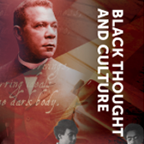More Information
 Black Thought and Culture (Alexander Street Press)
Black Thought and Culture (Alexander Street Press)
Content
The collection includes the words of Frederick Douglass, W.E.B. Du Bois, Carter G. Woodson, Alain Locke, Paul Robeson, Booker T. Washington, Malcolm X, Marcus Garvey, Sammy Davis, Jr., Ida B. Wells, Nikki Giovanni, Mary McLeod Bethune, Carl Rowan, Roy Wilkens, James Weldon Johnson, Audre Lorde, Thurgood Marshall, A. Philip Randolph, Constance Baker Motley, Walter F. White, Amiri Baraka, Ralph Ellison, Martin Luther King, Jr., Angela Davis, Jesse Jackson, Bobby Seale, Gwendolyn Brooks, Huey P. Newton, James Baldwin, Langston Hughes, Zora Neale Hurston, Randall Kennedy, Cornel West, Nelson George, Henry Louis Gates, Jr., Bayard Rustin, and hundreds of other notable people.
Approximately 20 percent of the items are previously unpublished and fugitive, such as:
- The transcript of the Muhammad Ali trial
- A full run of The Black Panther newspaper, with full-color images of every page as well as searchable text
- 2,500 pages of exclusive Black Panther oral histories owned by the Dr. Huey P. Newton Foundation
- Selected audio files, heard here for the first time
Available here electronically for the first time is the full run of Artist and Influence, originally published by the Hatch-Billops Collection. The journal includes 5,000 pages of rare interviews, oral histories, photos, original art, poetry, and other firsthand perspectives tracking African American cultural trends in the 20th century. Major contributors include Dizzy Gillespie, Amiri Baraka, Arnold Rampersand, Errol Hill, George C. Wolfe, Frederick O'Neill, Julie Dash, Shauneille Perry, James De Jongh, Eleanor Traylor, Owen Dodson, Anne Cooke Reid, Langston Hughes, Toni Cade Bambara, St. Clair Bourne, Butterfly McQueen, Abram Hill, Romare Bearden, Gertrude Jeanette, Richard Wesley, Earle Hyman, Woodie King, Jr., Thulani Davis, J.E. Franklin, Vinie Burrows, Stanley Crouch, Ron Milner, William L. Patterson, Wesley Brown, Arthur French, Charles Mingus, and Larry Neal. Many of the interviews took place when these figures were nearing the ends of their lives, capturing a historical record that would otherwise be lost.
How Will You Use It?
Black Thought and Culture creates unprecedented possibilities for the study of the historical development of black culture. Researchers can examine the ideas of one individual over time or compare the thinking of various figures on a given topic. It’s now possible, for example, to cross-search items from the personal journals of W.E.B. Du Bois together with more commonly known materials such as The Souls of Black Folk: Essays and Sketches, or to look at previously unpublished material by Paul Robeson alongside published works such as Here I Stand.
Search tools include a Table of Contents of Historical Events, making the database a must-have for research in black history and history generally, and also a Table of Contents of Questions, showing how various individuals responded in interviews about the same topics. Alexander Street’s Semantic Indexing makes questions such as these easy to answer: Did Muhammad Ali ever refer to Frederick Douglass? What were the reactions to the Watts riots of all authors writing from 1970 to 1975? Which passages in W.E.B. Du Bois’s works discuss slavery?